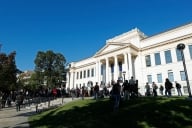You have /5 articles left.
Sign up for a free account or log in.
A new book, The Uncivil University, officially released today by the Institute for Jewish & Community Research, asserts that there should be a government role in combating what authors label “rampant” campus anti-Semitism and expression of anti-Israeli sentiments within academe. Many Jewish leaders take issue with both parts of that argument – saying that the book inappropriately equates all criticism of Israel with anti-Semitism.
From 2002-2005, the institute conducted over 50 interviews with students from a variety of campuses. Forty interviews were also conducted with leaders from Jewish organizations, like the American Jewish Congress and the Caravan for Democracy, the campus division of the Jewish National Fund. The institute also reviewed numerous student pamphlets, class syllabi, student newspapers, campus Web sites and university e-mail newsletters.
Notably, the analysis does not “purport to say” that anti-Semitism is rising or declining on college campuses.
Still, at a Thursday press briefing, Gary A. Tobin, a co-author of the book and director of the Leonard and Madlyn Abramson Program in Jewish Policy Research at the University of Judaism, in Los Angeles, said that anti-Semitism has “taken root” at colleges and universities all over the United States. He said that slurs and harassment are one component that constitutes this behavior, noting a January 2002 letter in the student newspaper at the University of Illinois at Urbana-Champaign, The Daily Illini, that contained the phrase, “the Jews, master salesmen that they are…” as well as the situation at Columbia University, where scholars were said to have intimidated Jewish and Israeli students. A committee investigating the charges ultimately found “ no evidence of any statements made by the faculty that could reasonably be construed as anti-Semitic.”
Despite these anecdotes, Todd Gutnick, a spokesman for Anti-Defamation League, said that in 2004, nationwide there were 74 anti-Semitic physical or verbal harassment incidents on campuses reported to the organization. In 2002, that number was 106. On Friday, the ADL as well as Tobin will present updated findings on ways to prevent anti-Semitism before the U.S. Commission on Civil Rights, which marks the first time the commission is examining this issue.
According to the most recent ADL audit, “By 2003, more effective counteraction and educational efforts by students and faculty helped to reduce the number of virulently anti-Semitic activities that have crossed over the line into harassment of Jewish students and other anti-Semitic phenomena in recent years.”
At the briefing Thursday, Tobin spent a good deal of time talking about the relationship he sees between anti-Semitism and “anti-Israelism” -- especially as it pertains to Middle Eastern studies professors. While saying that a person can be anti-Israel without being anti-Semitic, he argued that it is especially important to look at how faculty members tend to frame discussions about Israel.
“I would like to see some faculty members who argue against the interests of Israel say that Manhattan should be given back to Native Americans,” he said in an interview after his discussion of the book. “You hear little on campuses about establishing a state for Kurds or Mongolia, but the Israeli government is constantly put on the hot seat.”
Jeff Rubin, a director of communications for Hillel nationally, said that he thinks it’s important to explore where individual people are coming from in terms of anti-Semitism -- but that critiques of entire Middle Eastern studies departments are “inappropriate.”
“The language used in classroom debates sometimes has anti-Semitic overtones, said Rubin. “But every person who expresses an opinion different than the Israeli government is not an anti-Semite.”
Another argument from the book focuses on what Tobin calls a “frightening breakdown in a number of university processes involving many stakeholders within higher education.” He said that donors, alumni and trustees are not holding their universities as accountable for campus anti-Semitism as they should be. “Most of all, faculty and administrators exhibit unawareness, indifference, and sometimes cowardice in their failure to exert moral leadership in condemning anti-Semitism and anti-Israelism,” according to a statement prepared by the Institute for Jewish & Community Research for the U.S. Commission on Civil Rights where Tobin will testify.
He and his colleagues say that because they perceive universities to have done a poor job in those respects that both federal and state governments have the legal and moral authority to address anti-Semitism on campus. Tobin indicated that he’s in favor of the protection of the civil rights of Jewish students through legislation that would set guidelines for colleges and universities that accept federal and state funds.
Aaron Goldberg, associate director of the Israel on Campus Coalition, said that Tobin’s arguments about campus stakeholders are generally misleading and that “climates for Jewish students are for the most part very good.” He also noted that a number of colleges have installed Israel studies chairs, which have helped mitigate some of the issues Tobin has with Middle East studies programs.
While Goldberg agrees that universities have to institute mechanisms for dealing with anti-Semitism, he thinks that government intervention would be a “huge mistake” and would be harmful to academic freedom in general.








